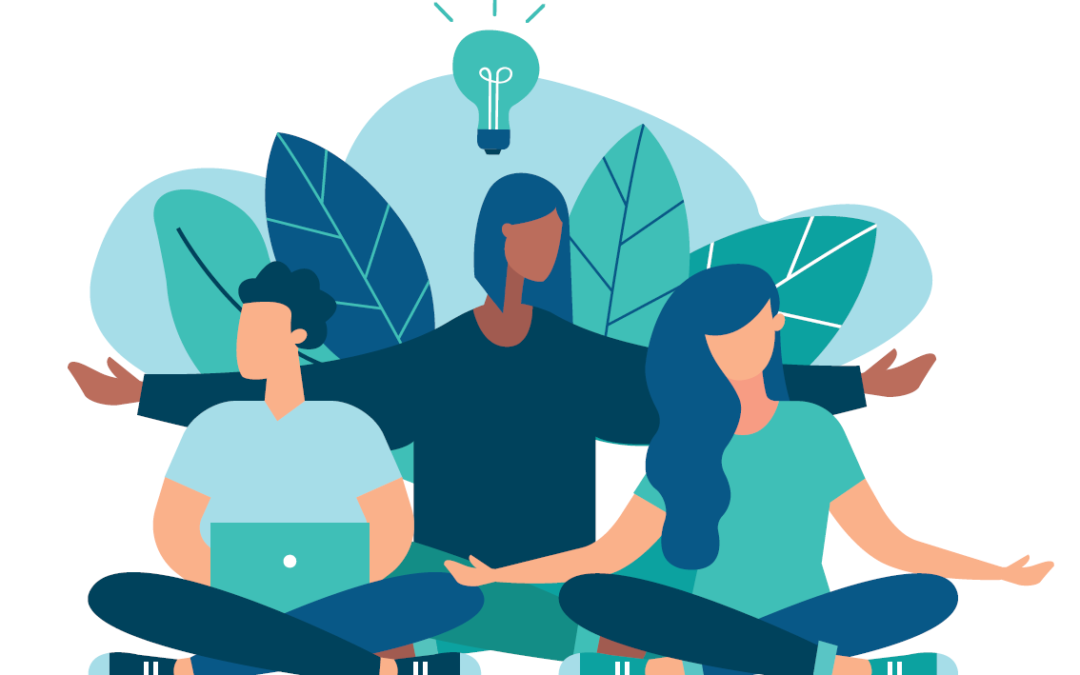
by Philip Payne | May 28, 2021 | Wellness Wheel
Last fall, I volunteered to be a coach for our inaugural “Wellness Wednesday” program, and that came with many unknowns. What would the structure be like? What would the turnout be? What exactly would we be doing as coaches? Still, aside from all those unknowns, I wanted to help coach anybody that could benefit from these Wellness Wednesday sessions. Throughout the program, it developed into more than I ever thought of. Having Apportis to use as a means to connect with other coaches and students and coaches was something that was very beneficial. To add onto that, hearing perspectives from other students about their knowledge of specific areas of the wellness wheel, which they spent time researching and creating presentations, was something that I found very insightful for myself.
As a coach tasked with presenting on financial wellness, I even learned some tips and tricks for myself on how I could better my own financial wellness for the future. Prior to these Wellness Wednesday sessions, I only thought of wellness as physical and mental wellbeing, but I was wrong. Wellness incorporates so much more, as the wellness wheel would show. Being a coach and attending these sessions is something I am grateful for. I typically am not the type to volunteer for something with so many unknowns, but I am glad I did this time, as it helped educate me in many ways, and I was able to share my knowledge of financial wellness with others.

by Philip Payne | May 28, 2021 | Mental Health, Uncategorized
Mindfulness is as simple as being aware of your surroundings. This sense of awareness is known to help relieve stress and mental health challenges. In a mindful state you are free of worry and open to positivity. You are able to see the world for what it is and also become more competent when interacting with others .
“Mindfulness is known to help people become more active, clear, imaginative and less resistant to change. It gives them the time to pause and reflect on decisions. At all times, mindfulness helps people choose to adjust and calm down so that the right action can be taken. It allows them to heed the small inner voice that is often diluted by feelings and opinions.”
One way to practice mindfulness is through meditation. Meditation impacts parts of the brain that enhance attention, memory, and focus. Even a short time of meditation can help us become overall more productive. Meditation is a practice that has been around since ancient history. It is said to have originated in India around 1500 BCE before traveling to other cultures and religions. In 2007 a survey found that 1 in 10 Americans have meditated and everyday the practice is becoming more popular.
The video referenced provides a calming, simple piece of mindfulness through meditation. It also guides you through breathing exercises that allows you to breathe in the positive and out the negative. Gratitude, strength, joy, and contentment are some of the positive things you are imaging taking in. While releasing any stress or hurt you may have on your mind or body.
This resource is great for me as a busy social work student During the stress of COVID and changes to the normal program. In addition, I am currently an Intern at Apportis. Apportis is a platform that provides resources to build up mental health. Through wireless connection you can access counseling, therapy and videos like this one. Since I have discovered this mindfulness video I try to watch it daily to keep myself calm yet energized. As a prospective social worker I am confident exercises like these will help soothe the mind and body of clients. I hope you find this to be a helpful resource as well, just click the link and relax.
https://wellnesstogether.ca/en-CA/positive-in-negative-out

by Philip Payne | May 14, 2021 | Wellness Wheel
Throughout my time at WSU, I’ve had many meaningful experiences, but I will admit that the Wellness program is marked as one of the most meaningful. I have made it my responsibility to holistically dedicate myself to the wellbeing of others while putting my own needs on the back burner. Given my passion, values and interest, I’ve never considered what I do as a burden or hassle because I love what I do. The Wellness program allowed me to take a step back and think about myself for once. The pandemic has been a challenging phase through my graduate school journey mentally, physically, emotionally and over the course of this time I did not take much consideration to attend my own needs. School has always been my first priority and with priorities comes sacrifices and the sacrifice happened to be my well-being.
I’ve always prided myself on being a social individual because any setting I am more than willing to engage but as time have progressed that part of me has changed. Due to the pandemic, I’ve been choosing isolation more outside of work, class or family gatherings. I used to be the individual always ready and on go for the next outing, excursion or lunch date but now I much rather be alone or in the house. I was assigned the Social Wellness in which was a no brainer for me because it’s like second nature but throughout the assignment I had realized that I needed to get back to the old me and I am grateful for that.

by Philip Payne | May 6, 2021 | Wellness Wheel
When the pandemic first began, I felt like I could take on the world and I started to work on aspects of my life that I was ignoring with the grind of working, trying to earn a Master’s degree, balancing a social and family life, as well as, looking for internships. However, after a couple of months, I started to get a little burnt out on everything. Working and attending class from home helped me to feel better mentally in terms of not having to constantly commute from one place to another but the lack of separation made it hard for me to feel motivated to cultivate wellness in my life. Then, the opportunity to be a wellness coach and work with the Apportis app presented itself. I felt that this was my chance to be accountable with myself and hopefully help others along the way.
My experience as a wellness coach really helped me to look critically at my own wellness and find actionable steps I could take to foster wellness in all aspects of my life. The Apportis app was instrumental in this process because it provided me with helpful resources that I could use in my personal life and share with others like assessments, activities, and general information about different aspects of the wellness wheel. Using the Apportis app to connect with others also helped me get through the feeling of isolation that has come with the pandemic. Connecting with peers bi-weekly to learn how we can cultivate wellness in our lives was a great experience and the Apportis app helped to make that happen.
Having dealt with some of the negative effects COVID-19 has had on my mental health, I think all colleges could benefit from offering the Apportis app to students, faculty, and staff. The app allows individuals to connect with clinicians without Wi-Fi connectivity which can be instrumental in helping people get the help they need. Apportis is an invaluable resource and my hope is that more colleges invest in their students’ mental health and personal wellness.

by Philip Payne | Apr 26, 2021 | Rural Mental Health
Farmers are the unsung heroes of the world. They work tirelessly to provide fresh and healthy produce and other sustainable food sources for the masses, and yet very seldom get the credit they deserve. According to ADAMA, which is a website dedicated to farmers advocacy and education, farmers shape the landscape we live in, heat our homes and are advocates for a brighter and greener future. Yet there is a dark side to farming, one that consists of debt, suicide and a mental health crisis that is sweeping the globe. According to one article,
It is estimated that 1 in 4 people worldwide experience issues with their mental health annually. If farmers experience problems with their mental health at the same rates as the general population, this would mean that approximately 25% of farmers worldwide are struggling with their mental health every year. Globally, there are more than 570 million farms, of which approximately 550 million are family-run. With a conservative estimate of 2-member families, this would mean that every year, roughly 225 million farmers worldwide may struggle with their mental health.
These mental health concerns may be directly linked to issues that farmers face, such as fear of not being able to provide for their families, stress of a bad crop season, or strain from large grocery chains to fulfill ever increasing food demands. Recently, in India, a country where 60% of the population works in agriculture, climate change has affected the yield that low-income rural farmers can produce and has in turn negatively impacted the mental health of these farmers. Threat to property, income and crops has heightened risk of suicide, with one study finding that India averaged 28 suicides a day from the farming community.
Farming is a multi-generational business, with 98% of the farms worldwide owned by families. The risk of losing generational wealth and not being able to provide for future generations puts undue stress on the entire family unit. The loss of the head of the family from suicide or old age also places the burden directly on the family to provide.
Despite this bleak outlook, there is hope in the form of the Apportis tele-behavioral health platform. This platform enables case managers to provide assistance to farmers and their families with mental health concerns. It does not require wifi, an asset that is especially important to those living in rural communities. By being able to quickly and securely meet with a case manager to discuss concerns or goals, these farmers have the ability to get help when and where they need it. Because farmers often do not have the luxury to take time off from work, the Apportis platform reduces barriers to time, transportation and childcare, while providing screen to screen access to helpful case managers.
Additionally, resources can be loaded onto the platform that can be accessed by a farmer in crisis at any time. These may include a variety such as hotline numbers, financial literacy, farmer advocacy, information on farmers with disabilities, and breathing exercises to reduce anxiety.
Farmers help shape the world and their mental health is paramount. Apportis is an advocate for farmer mental health, and you can be too. Start by looking at the links below.
https://www.adama.com/en/our-commitment/global-farming/farming-stories/farmers-shaping-the-world
https://www.ncbi.nlm.nih.gov/pmc/articles/PMC6894791/
https://letmebreathe.in/2020/08/21/the-burning-mental-health-of-farmers/
https://www.cbc.ca/news/world/india-farmers-suicide-1.5968086
https://ofbf.org/2020/04/02/mental-health-care-vital-as-farmers-concerns-grow/
https://www.ruralhealthinfo.org/topics/farmer-mental-health
https://www.farmaid.org/blog/fact-sheet/why-farmers-face-unique-threats-from-stress/
https://www.sciencedirect.com/science/article/pii/S0305750X15001217






Recent Comments